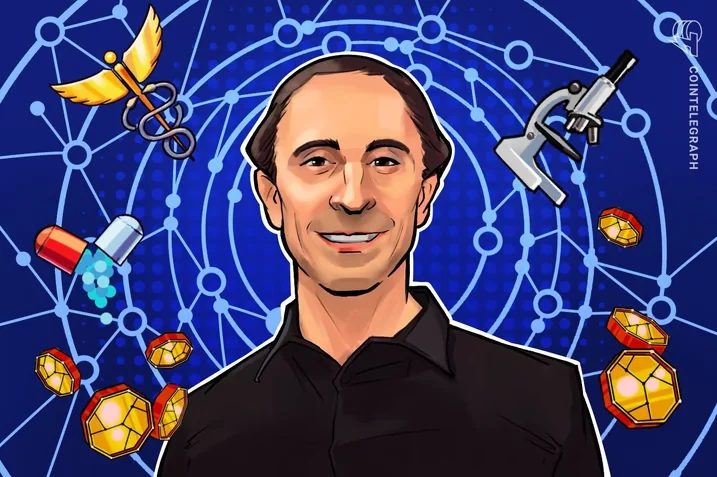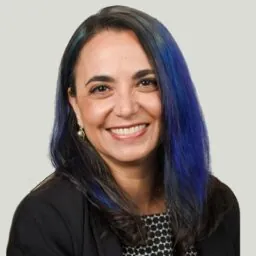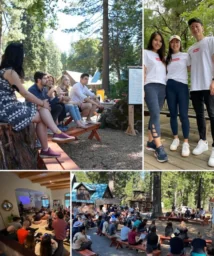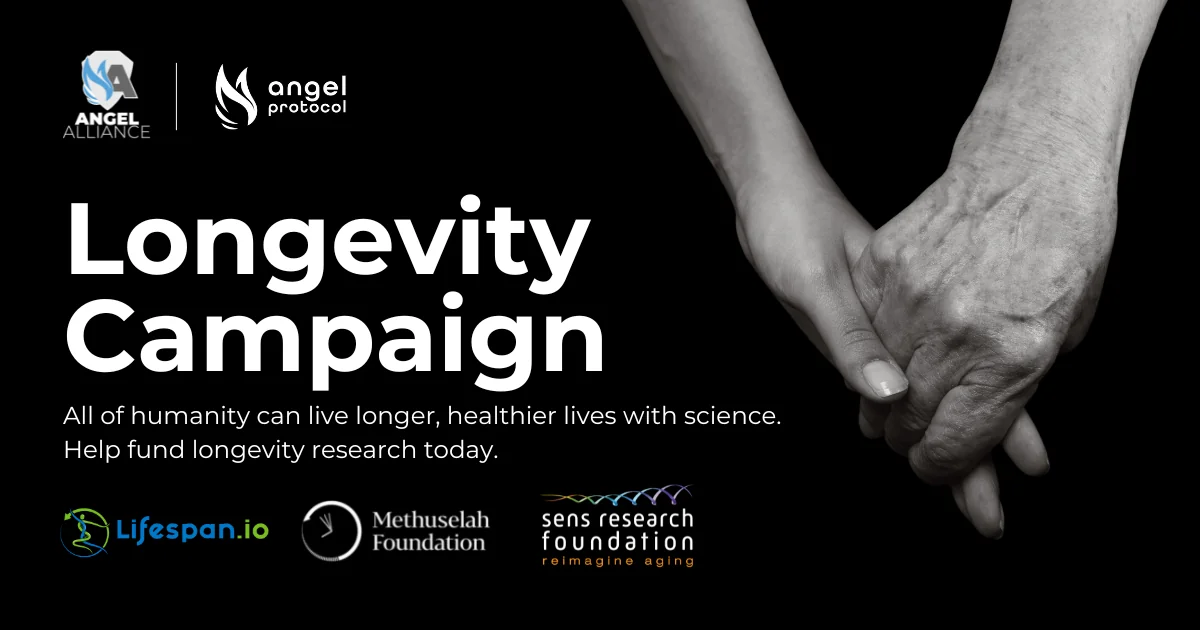New Year, Same Goal to End Age-Related Diseases
- We have been attending important longevity-related events.

The new year is well underway, and we have been our usual busy selves. Join us for the first editorial of the year, and find out about the awesome things we have been doing for longer, healthier lives.

Decentralized science could support aging research progress
Lifespan.io President Keith Comito recently appeared in Cointelegraph, a news site covering fintech, blockchain, bitcoin, and decentralized science (DeSci). In this longevity-related article, Keith highlights the benefits of blockchain tech and decentralization in longevity research.
“We started our nonprofit back in 2014. Back then, few credible researchers would be caught dead saying they were working on aging. It was still kind of a scientific backwater. So, we wanted to emulate what the cancer research advocates did, starting in the ‘40s.” – Keith Comito
Keith is spot on when he talks about how things were just over a decade ago, fortunately things have changed a great deal since our early days. More and more credible (and less “incredible”) researchers have gotten on board with the idea that aging is something that we can and should do something about.
A decade ago, suggesting that aging could be reversed could have ended your career; today, there are an increasing number of researchers involved in serious efforts to develop rejuvenation technologies with the goal of slowing or even reversing aging.
One of the things holding back rapid progress in our field is funding. Traditional funding systems have a tendency to be risk averse, which means the more bold, high-risk, high-reward projects are usually overlooked in favor of safer but less ambitious projects. The good news is that DeSci, blockchain-based systems have great potential for getting around this problem.
We highly recommend checking out this article and finding out why Keith believes that the power of DeSci could be critical in funding aging research in the future.
If you would like to learn more about how DeSci based funding works, check out our topic on that very subject.
Tiffany Vora joins the Lifespan.io Industry Advisory Board
Biologist and science speaker Dr. Tiffany Vora has joined our industry advisory board and will be helping to support our ongoing growth and development this year.
She has a wealth of experience in advising on how best to harness technology for a better future. This includes drawing on her background in molecular biology and biotechnology as well as her science communication skills.
Tiffany is the Faculty and Vice Chair of Medicine and Digital Biology at Singularity University, Faculty at EY Tech University, and also a non-resident Fellow of the GeoTech Center of the Atlantic Council.
I am thrilled to be joining Lifespan.io as an Industry Advisory Board member. It’s a critical moment, with longevity science making important strides as businesses and societies start to grapple with the opportunities – and challenges – of longer, healthier lives. I’m looking forward to supporting the Lifespan.io community in their advocacy, education, funding, and research efforts for longevity.
We look forward to working with Tiffany in the future and benefitting from her expert guidance and knowledge.

 Lifespan.io Executive Director Stephanie Dainow was a leynote speaker and workshop host for the 2023 Longevity Winter Camp hosted by the Longevity Biotech Fellowship. This retreat-style event featured workshops focusing on the aging and longevity research space as well as discussions with the goal of bringing more talent into the field.
Lifespan.io Executive Director Stephanie Dainow was a leynote speaker and workshop host for the 2023 Longevity Winter Camp hosted by the Longevity Biotech Fellowship. This retreat-style event featured workshops focusing on the aging and longevity research space as well as discussions with the goal of bringing more talent into the field.
Stephanie was on hand at the winter camp to lead discussion and provide her experience in business development, messaging and communications best practices, and various forms of advocacy critical to not just the longevity field, but also increasing the rate of success when pitching ideas to funders and friends.
Those of us working in the field, especially on the advocacy and journalism side of things, know that communicating with the public can be challenging. There are a lot of misconceptions about our field of research and the goals of life extension, and it can be very demanding dealing with them day in and day out.
Knowing that you are part of a larger community and that you are not advocating for longer healthier lives alone is very motivating. Stephanie was joined at the camp by hosts Anastasiya Giarletta, Omri Amirav-Drory, Matthew Scholz, Matthew O’Connor, Jun Axup, Javier Tordable, Anastasia Egorova, Nikola Markov, Dylan Livingston, Robert Cargill, Mark Hamalainen, Yuri Deigin, Mahdi Moqri, Peter Fedichev, and Alex Kadet.
Events like this allow us to meet with like-minded colleagues and supporters of life extension, which can be a great way to recharge mental batteries. Living in an echo chamber all the time isn’t useful, but connecting with the longevity community at events like these can be a real boost to morale.
Animating the science of aging
Cancer is caused by genomic instability, which leads to mutations in cells that cause them to multiply out of control. It can be considered the poster child of age-related diseases and advancing age is the primary risk factor for developing it. While cancer can affect young people too, the chances of it occurring rise greatly from age 65 onwards.
There are hundreds of known types of cancer, and they originate in many different organs and tissues. We teamed up with SENS Research Foundation to create a Life Noggin video that focuses on the SENS approach to treating cancer.
We have a second helping of video goodness from Blocko, the host of Life Noggin. This time, we teamed up with the folks at NOVOS to produce a video about aging biomarkers, particularly epigenetic clocks. These clocks measure your biological age and give a true picture of how old you really are, not just how many candles are on your birthday cake.
Life Noggin is our edutainment channel that explains science and technology in a fun animated pop-sci style. Because we have an audience of 3.26 million subscribers, we can engage the wider science community about all the amazing research happening right now. This is an example of how we use education and edutainment to engage new audiences about aging and rejuvenation research.
We would like to thank SENS Research Foundation and NOVOS for sponsoring these videos. If you are interested in sponsoring your own video on Life Noggin, please feel free to get in touch with us.
Longevity Hackathon
Lifespan.io President Keith Comito was one of the mentors for the recent VitaDAO Longevity Hackathon.
The event was a longevity-focused hackathon, hosted by VitaDAO, and supported by Lifespan.io, the Healthy Life Extension Society (Heales), the Albert Einstein College of Medicine, R42, the Foresight Institute, and the International Longevity Alliance.
With a prize fund of 5,000 USDC, 10,000 VITA, and 1,000 euros, the hackathon saw 10 teams compete over Friday to Sunday last week.
Keith had this to say about the hackathon:
During the ideation weekend, I offered guidance to the participants and helped to steer their projects towards focusing on targeting the causes of aging. There were around 100 participants competing in the hackathon composed of people with backgrounds in biotechnology or IT. Some of the participants were new to theories like the hallmarks of aging, and it was a great experience helping to prime a new generation of researchers and developers for our field.
By the end of the weekend, the participants had formed 10 teams ready for the Hackathon itself. They focused on various areas of research including sirtuin activating compounds, prevention and treatment of age-related diseases, drug discovery, deep learning in healthcare, and genomics.
At the end of the event, the teams gave their presentations, and myself and the other judges voted to choose the winners. The winners were based on various criteria such as innovation, execution of the concept, presentation, and relevance to the core drivers of aging.
The winners have now been announced, and we wish to give our congratulations to each of the winning teams!

The winning teams have been allocated both cash and VITA tokens to help their projects develop. Among the winners, there is a particular focus on systems with open source and decentralization components. This is further evidence that decentralized science (DeSci) could be a powerful driver of progress in our field in the near future.
Overall, it was an exciting experience to be a part of; and we applaud LongHack and VitaDAO for working to build our community and to bring more researchers, computer scientists, and passionate altruists into our field.

Save the date for Ending Age-Related Diseases 2023
On August 10-12, 2023, we will be holding our sixth annual Ending Age-Related Diseases conference to bring entrepreneurs and investors, pharma and biotech companies, researchers, and government organizations together. Fostering the exchange of information and encouraging cooperation between the various parts of the industry is a large goal for our non-profit organization.
Solving aging will need a coordinated industry working together to turn aging research into prescribable medicine. This is where Lifespan.io is really helping to move things forward and is the focus of our conference. We are currently focusing on tangible outcomes and our next steps.
This will be a mixed virtual and physical hybrid event taking place in New York City and online. We will be announcing speakers, opening ticket sales, and publishing a program in the coming months. If you would like to stay informed about the conference and ticket offers, register for our free newsletter today!
Clubhouse: Why Longevity Research Matters Now
On the Clubhouse social media platform, Keith Comito and Stephanie Dainow took part in a discussion panel along with Chauncey St. John, Maria Entraigues Abramson, Florina Gobel, Ravi Jain, Michael Rae, Lilli Fishman, and Nita Jain.
The panel explored why there should be more focus on aging and longevity research. While our field is making some really great advances in its understanding of aging, it is relatively poorly funded compared to other areas of medical research, such as cancer, stem cells, and tissue engineering.
DeSci: Fad or Future?

Decentralized science (DeSci) is poised to be a catalyst for progress in our field and could present a viable alternative to traditional funding sources. Moonshot projects that fall foul of the risk aversion culture in traditional grant systems could see the light of day via the DeSci approach.
Lifespan.io recently took part in an online discussion panel about DeSci. The topic of the panel was “DeSci: Fad or Future?”. To discuss it, Dinidh O’Brien, Head of Public and International Relations at Data Lake and MC of the roundtable, invited Keith Comito, President of Lifespan.io; Jelani Clarke, part of the core team at DeSci World; Jeffrey Hsia, CEO of Scisets; and Dr. Wojciech Sierocki, Data Lake’s co-founder and CEO.
Support us with the Longevity Cause Fund
The Longevity Cause Fund is a cryptocurrency fundraiser in partnership with SENS Research Foundation and the Methuselah Foundation, facilitated by Angel Protocol.
All proceeds from the fundraiser will go to these three non-profit foundations in support of aging research and advocacy.
This is an endowment scheme designed to create sustainable funding for key players in the aging research and advocacy community. Half will be used for anti-aging work that is currently underway. The rest will be invested in perpetual endowments that will provide ongoing support for this work — forever. Aging affects us all.
Great news: the first $10k donated is also being fund matched by the Angel Alliance. That means any donation no matter how big or small will be worth even more! Help us help you to stay healthier for longer by making a donation today!







